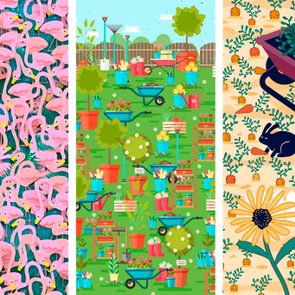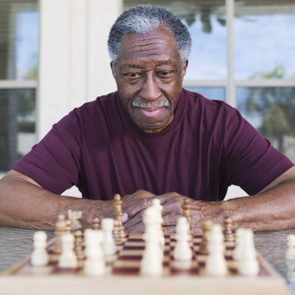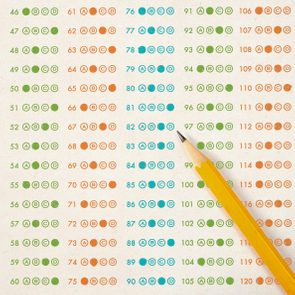What Is Wordle—and How to Win, According to Experts
Updated: May 03, 2024

Wordle is part strategy, part luck, and a bit addictive!
Like many people, I’m a fan of brain games. Ever since I was a kid, I’ve loved challenging myself with word search puzzles, crosswords, spelling bees, and other language-based brainteasers.
So when Wordle first hit the scene as an indie game sensation, I was instantly hooked. It wasn’t long before the New York Times added Wordle to its suite of games, but if you don’t regularly read it, you might still be asking, “what is Wordle?”
To learn more about Wordle, I interviewed Nancy Drescher, a linguist at Minnesota State University, and Kei Lutalo, director of the Academic English Preparatory Program at the University of New Haven. Read on to learn how to play Wordle — and how to win.
Get Reader’s Digest’s Read Up newsletter for more brain games, knowledge, travel, tech and fun facts all week long.
About the experts
|
What is Wordle?
Wordle is a puzzle that requires you to figure out a new secret word each day by guessing letters. It’s a bit like the classic childhood game “Hangman.” One of the main differences, however, is that the secret Wordle word is always five letters long.
You play Wordle on your computer, phone or tablet, and every player worldwide is working toward guessing the same daily secret word.
After you complete the puzzle, you can share your results on social media or in a text message or email to friends and family.
Josh Wardle, a software engineer in Brooklyn, created Wordle as a game for just himself and his partner to play, naming the game Wordle in a twist on his own last name. Slowly, he shared the game with friends and family in a WhatsApp chat; in October 2021, he released it to the public. It went viral, and the New York Times purchased Wordle from Wardle in January 2022.
It remains immensely popular, and experts have theories about why.
“It’s easy enough that most people can feel some success regularly,” says Nancy Drescher, PhD, a linguist and professor in the Department of English at Minnesota State University, Mankato, but it’s also “challenging enough that you can feel your brain working.”
The game can even be a little addictive. Players “strive to improve their … skills and beat their own or others’ records,” says Kei Lutalo, director and senior lecturer of the Academic English Preparatory Program in the Tagliatela College of Engineering at the University of New Haven.
Lutalo says the social nature of the game, along with the fact that it’s free and that it has no time pressure and no ads, makes it even more appealing. It even offers cognitive benefits. “I use Wordle in my classes to help my students in the areas of vocabulary expansion, pattern recognition, and deductive reasoning,” he says.
How to play Wordle

You can play Wordle in a web browser on the device of your choice, or you can download the NYT Games app. You don’t need to be a subscriber to play, though the Times does recommend that you create a free account so you can play on different devices without resetting your winning streak or other statistics.
The game opens with a blank grid of six rows, with five empty spaces in each. You get six attempts (one word in each row) to decipher the secret five-letter word. You win the game if you successfully guess the word within the six allotted attempts. (Trivia fans: The first-ever solution was the word “CIGAR.”)
Each time you guess a word, the puzzle provides feedback: Any letter that’s in the correct position in the hidden word turns green. If you guess a correct letter but in the wrong position in the word, it turns yellow. If you guess a letter that isn’t part of the word at all, the square turns gray. (You can change the color scheme for better visibility by using the gear wheel at the top of the game.)
Some people focus on attempting to solve the puzzle in the fewest number of tries. Others focus on maintaining their winning streak, regardless of how many tries it takes. Of course, keeping up a streak means playing every single day, whether you’re on vacation, you’re sick or just insanely busy.
Tips for playing Wordle
Few hard and fast rules apply. But there are a few helpful things to know:
- Wordle solutions never include plurals that end in -ES or -S. (However, other plural forms, such as GEESE or FUNGI could be solutions.)
- The puzzle also never uses past tense words that end in -ED.
- The puzzle never uses proper nouns as solutions. (However, proper nouns that are also words in their own right, such as SALLY and CAROL, have occasionally stumped—or infuriated—players.)
Recently, in a TikTok video, Wordle editor Tracy Bennett noted that the puzzle would eventually run out of words and might consider permitting plurals or past tenses, or recycling already used words.
You might wonder if it’s better to try to guess all the vowels first or all the consonants. According to Drescher and Lutalo, a case can be made for each strategy.
- “Vowels are typically more common in English words, so starting with them can potentially reveal a significant portion of the target word early on,” says Lutalo.
- “Unfortunately, with Wordle,” Drescher says, “you don’t get to know if there is more than one of the same vowel [or consonant]. Figuring out the vowels does significantly reduce the number of possible words in most cases.”
- “Consonants often provide more distinctive patterns and clues about the structure of the word,” Lutalo notes. However, he adds, “Consonants can be more varied and less predictable than vowels.”
What are good starting words in Wordle?

Asking what the best opening moves are in Wordle is sort of like asking what’s the best pizza. Everyone will have an opinion and will adamantly defend it.
To win, some people (like me!) start with whatever five-letter word first pops into their mind that day. That approach helps to “keep the game fresh and engaging,” says Lutalo. “It encourages players to think creatively and adapt to the specific puzzle they’re facing.”
Others use the same opening word every day. This method helps players improve their strategy over time.
“If the goal is to give your brain a little exercise, then it seems that starting with a different word each day would stretch you out just a little bit more,” Drescher says. “If your goal is to finish in as few moves as possible, I suppose it would be better to start with the same word that use the most statistically used letters.”
But exactly which letters and words those are is a matter of some debate. Many people rely on the Wordle bot, which has maddeningly changed its suggested starting word several times. Currently, the bot starts with CRANE in standard mode.
But not everyone trusts the bot. “There isn’t a universally agreed-upon set of ‘best’ opening letters or words like the common guesses in Wheel of Fortune (RSTLNE),” says Lutalo.
That hasn’t stopped people from theorizing about the best opening word or letters.
For example, Joshua Blackburn, founder of Two Brothers Games, posted on the social platform X that he had completed an analysis of 976 Wordle puzzles for letter frequency, letter combinations and most commonly used initial and final letters. Some of his findings really surprised me, especially the most common first letters:
- S (14%)
- C (9%)
- B (8%)
Other facts that surprised me were:
- 59% of words have two vowels—most commonly A and E, followed by E and I and then E and O.
- 11% of words have double letters, most commonly:
- EE (2.2%)
- OO (2.1%)
- LL (1.9%)
According to Blackburn, the best starting words are:
- TRACE
- STARE
- SHARE
- ARISE
- TRADE
- SHORE
Not everyone agrees with this analysis, however.
In 2022, at the peak of the game’s popularity, Dimitris Bertsimas, Boeing Professor of Operations Research at MIT, along with Alex Paskov, one of his PhD students, did a deep dive using supercomputers to determine the very best opening word.
They published a 21-page paper, diving into algorithms, “classification and regression trees,” “transition vectors,” and other complex concepts that were way over my head. But at the end, the researchers had sussed out the best starting word:
- SALET, a word for a 15th-century helmet.
According to the paper, SALET can solve the puzzle in an average of 3.421 guesses, faster than any other word in the English language.
Regardless of what strategy you employ, Lutalo says it’s important to remain flexible and have fun.
Why trust us
Reader’s Digest is known for our humor and brain games, including quizzes, puzzles, riddles, word games, trivia, math, pattern and logic puzzles, guessing games, crosswords, rebus, hidden objects, and spot-the-difference challenges. We’ve earned prestigious ASME awards for our entertainment content and have produced dozens of brain-teaser books, including Word Searches, Word Power, Use Your Words, Fun Puzzles and Brain Ticklers, Mind Stretchers, Ultimate Christmas Puzzles and more. Our 10 published volumes of Mind Stretchers were edited by Allen D. Bragdon, founder of The Brainwaves Center and editor of Games magazine. Read more about our team, our contributors and our editorial policies.
Sources:
- Nancy Drescher, PhD, professor in the Department of English at Minnesota State University, Mankato. She holds a Ph.D in linguistics from Northern Arizona University and an M.A. in education (TESL emphasis) from Regis University.
- Kei Lutalo, senior lecturer and director of the Academic English Preparatory Program in the Tagliatela College of Engineering at the University of New Haven.
- WordleWise
- An Exact and Interpretable Solution to Wordle






















